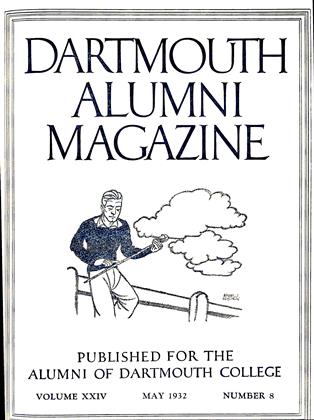By Hadley Cantril '2B. Psychological Review Company, Princeton, N. J. 1932. pp. 109.
This monograph, which appears under the sponsorship of the American Psychological Association, sets before the reader a wide and interesting range of experimental observation dealing with the study of personality. Its purpose is a clarification of the nature of "attitudes," or determining tendencies of thought found in individuals. As such it is at once a contribution to general and to social psychology, both theoretic and applied.
In his study of attitudes, Dr. Cantril's point of departure is (after a brief historical survey of the problem) an anlysis of meaning. Backed by experimental data, he presents a strong case for imageless comprehension. Here he starts from where the Wurzburg school of psychologists left off and determines more precisely the conditions under which these imageless processes function. In this way he clears the ground for a discussion of "general attitudes," the validity of which his exposition places beyond all question.
In comparing general and specific attitudes toward given objects Dr. Cantril discusses their differences in respect to the imagery involved and the clues which each affords in the understanding of personality. In what is perhaps the most excellent chapter of his monograph he makes clear the fact that general evaluative attitudes are not limited to specific situations, but express relationships inherent in those situations, thus being applicable to them. This conclusion, which is supported by cogent reasoning directed against such specificists as Thorndike and Symonds, is of great importance, for it affords the social psychologist the means of grasping the structure of personality both in its static and dynamic (directive) aspects. Finally Dr. Cantril compares those general attitudes, which he has defended against the specificists, with specific attitudes in respect to memory (recall) and relative constancy. All of the conclusions drawn from these elaborate analyses are clearly formulated and stimulating.
The value of Dr. Cantril's work lies both in his method and in his conclusions. Bymeans of discriminating analysis and a broad use of all experimental means available, he has succeeded in giving his subject matter a firm basis in the science of psychology. By virtue of this method he has come to valuable conclusions regarding one of the most important aspects of mental life: the nature of fixed attitudes towards objects. As Professor G. W. Allport has said in his justly laudatory foreword, "the phenomenon of generalization in attitude has made a successful debut in the laboratory."
Arthur B, Hulbert, a lineal descendant of President Eleazar Wheelock, is the author of a popular and important book "Forty-Niners. The Chronicle of the California Trail" published by Little Brown.
 View Full Issue
View Full Issue
More From This Issue
-
 Class Notes
Class NotesCLASS OF 1929
May 1932 By Frederick William andres -
 Article
ArticleDirectory of Alumni Associations and Classes
May 1932 -
 Lettter from the Editor
Lettter from the EditorPublic or Private Schools: A Letter to the Editor
May 1932 By Louis P. Benezet -
 Article
ArticleA Student in the Early Eighteen Hundreds
May 1932 By Mary B. Slade -
 Class Notes
Class NotesCLASS OF 1905
May 1932 By Arthur E. McClary -
 Article
ArticleLetch worth Village—A Home for Mental Defectives
May 1932 By Charles S. Little, M.D.
Books
-
 Books
BooksFACULTY PUBLICATIONS
February, 1922 -
 Books
BooksTUCK SCHOOL PUBLISHES "MANUAL ON RESEARCH AND REPORTS"
MARCH 1931 -
 Books
BooksTalking Sense
JAN./FEB. 1978 By CHARLES M. WILTSE -
 Books
BooksBURR OAKS,
February 1948 By F. Cudworth Flint. -
 Books
BooksNO SHIP MAY SAIL
June 1942 By Herbert F. West '22 -
 Books
BooksThe Private Papa
June 1981 By J. D. O'Hara Jr. '53


